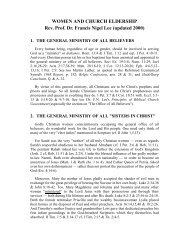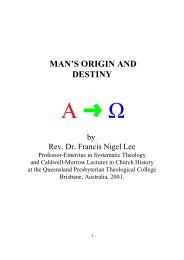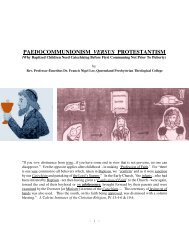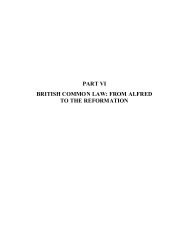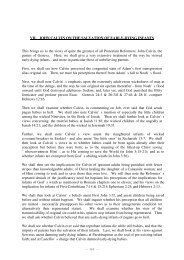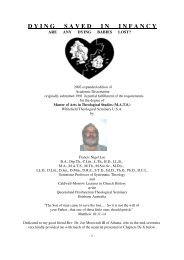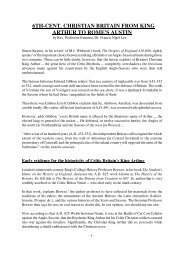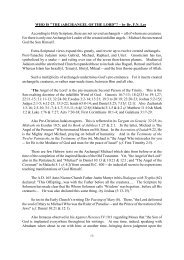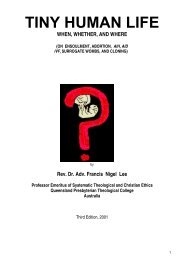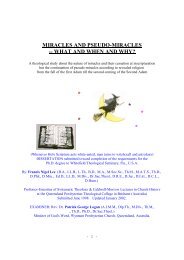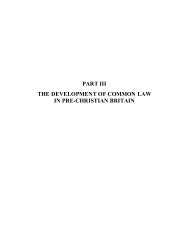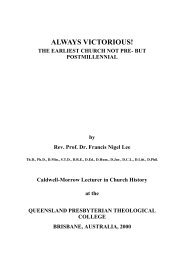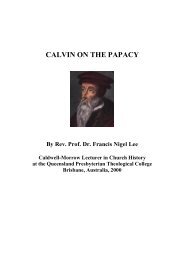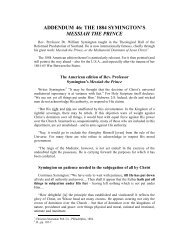I suppose we could well start with France. That land is one <strong>of</strong> the most important roots <strong>of</strong> the WhiteSouth African civilisation. After all, White South Africa does claim to be a Calvinist civilisation --and Calvin was a Frenchman. But not only do we have the massive influence <strong>of</strong> Calvin via theSynod <strong>of</strong> Dordt and the "Dutchified" version <strong>of</strong> French Calvinism as exported to South Africa some33 years later. We also have massive French Huguenot emigration from France straight to SouthAfrica, with no contact with Holland whatsoever.You see, in 1652 the first White people went to South Africa. <strong>The</strong>y were a mixture <strong>of</strong> DutchCalvinists and German Calvinists. But in 1688, after the revocation <strong>of</strong> the Edict <strong>of</strong> Nantes in France(which had formerly given toleration to the French Calvinists), the French Calvinists becameextremely uncomfortable. <strong>The</strong>y fled to all parts <strong>of</strong> Europe. Some <strong>of</strong> them ended up in America andEngland; but most <strong>of</strong> them that survived, ended up in South Africa.So, especially South Africa became the haven <strong>of</strong> those French Huguenots who had to flee for theirlife. This had a very wonderful effect on the development <strong>of</strong> Calvinism in South Africa. If DutchCalvinism and German Calvinism had been vigorous and blunt, French Calvinism introduced anelement <strong>of</strong> southern hospitality and graciousness which the Dutch and the Germans lacked.So this resulted in a happy mix. It produced a people who would be frank like the Germans -- butalso refined and sweet at least some <strong>of</strong> the time like the French. All that went into the melting pot.<strong>The</strong> influence <strong>of</strong> Calvin is thus very marked in South Africa. Indeed, about fifty miles from theplace where my wife grew up, there is a town called Calvinia -- deliberately named after JohnCalvin in Switzerland. It is indeed quite a centre <strong>of</strong> Calvinist thought, even though it is a rural townand not really urbanised.But if South Africa did get a lot <strong>of</strong> positive influence from France after 1688 -- thank God it hardlygot any negative influence from France! By that, I mean that the later French Revolution <strong>of</strong> 1789hardly touched South Africa at all. Just a few sailors rounding Cape Town exported some <strong>of</strong> thesewild liberal ideas. But for the most part, South Africa was not exposed to the ideas <strong>of</strong> the sacredrights <strong>of</strong> man and the equality <strong>of</strong> all people. Instead, she continued to believe in the sovereignty <strong>of</strong>Almighty God and absolute predestination -- as the Europeans and the Americans had done beforethe birth <strong>of</strong> the hellish French Revolution. For that protection one can be extremely grateful.While the atheistic French Revolution devastated France and Holland, and even besmirched theUnited States to some degree, South Africa was hardly touched. South African French, Dutch,German and later Scottish Calvinism is still "hard-line" unmitigated sixteenth century originalCalvinism -- to this very day. That which calls itself Calvinism grapples not only against thosestreams from the French Revolution at that time -- but also against the more recent imports <strong>of</strong>socialistic and world-wide secularism in our own day, for the first time, through the results <strong>of</strong> masscommunication media such as television.I am sorry to say that since South Africa finally got television (only in the mid-seventies), "Dallas"is now the most popular program on South African television (as it is on Japanese TV, British TV,and American TV). So I would say that not John Lennon is more popular than Jesus, but perhapsJ.R. Ewing might be -- at this particular moment. Of course, John Lennon and J.R. Ewing do notrise from the dead after their deaths. Nevertheless, you do have here the contraction <strong>of</strong> the worldand the sophistication <strong>of</strong> mass media -- which are spreading many ideas all over the world. That iswhy we Calvinists have got to get in on this thing, and export our ideas by utilising these channelstoo.A second root <strong>of</strong> South African Calvinism, is German Calvinism. I remind you that it was inGermany that the Heidelberg Catechism was born in 1562. It was accepted as authoritative in the
Dutch churches at the Synod <strong>of</strong> Dordt in 1618 -- and 33 years thereafter exported to South Africa.During the same period, it was also exported to New York State (under Pieter Stuyvesant) throughthe oldest denomination in North America (the Dutch Reformed Church).Together with that German Calvinism <strong>of</strong> the Heidelberg Catechism, there were also the legaldoctrines <strong>of</strong> protosphere-sovereignty developed by the great German jurist Johann Althusius, andthe tremendous encyclopaedic knowledge <strong>of</strong> Johann Heinrich Alsted. Indeed, the haziness <strong>of</strong> theborder between Holland or "Duitsland" and Germany or "Deutschland" at that time -- meant thatmany people who were really Germans and not Dutchmen were enrolled into the Dutch East IndiaCompany.That company wanted to trade with and extract wealth from what is today Indonesia in the East.Similarly and simultaneously, the Spanish and the Portuguese wanted to extract wealth from SouthAmerica, and the British West Indies Company wanted to extract wealth from the Caribbean andcertain parts <strong>of</strong> the North American east coast.<strong>The</strong> third root <strong>of</strong> South African Calvinism, is Dutch Calvinism. That is the Calvinism <strong>of</strong> theBelgian Confession <strong>of</strong> southern Holland in 1562; the five-point Calvinism <strong>of</strong> the InternationalSynod <strong>of</strong> Dordt in Holland in 1618; and the Calvinism <strong>of</strong> Gisbert Voetius, the father <strong>of</strong> Roman-Dutch Law. He took the Old and the New Testaments very seriously, and designed thejurisprudential outline for the ruling <strong>of</strong> society in 1636. It is also the Calvinism <strong>of</strong> the Dordt DutchBible and its postmillenial and theonomic footnotes (<strong>of</strong> 1637) -- the Calvinism that was exported toSouth Africa just fifteen years after that.So then, the important dates are:1562 <strong>The</strong> completion <strong>of</strong> the Heidelberg Catechism & the Belgian Confession.1564 <strong>The</strong> death <strong>of</strong> John Calvin.1618 <strong>The</strong> juristic views <strong>of</strong> Johann Althusius.1619 <strong>The</strong> Five-point Calvinism <strong>of</strong> the International Synod <strong>of</strong> Dordt.1620 <strong>The</strong> "Americans" on the Mayflower, who went not south to South Africa but westbound(yet and for the same reason) to what is now North America.1636 <strong>The</strong> jurisprudence <strong>of</strong> Voetius.1637 <strong>The</strong> Dordt Dutch Bible and its footnotes.1643f <strong>The</strong> production <strong>of</strong> the Westminster Standards in Britain.1650 <strong>The</strong> decision to colonise South Africa.1688 <strong>The</strong> fleeing to South Africa <strong>of</strong> French Calvinists, the cream and middle class backbone<strong>of</strong> French society who now had to leave their homeland <strong>of</strong> account <strong>of</strong> religious persecution, andwho found a refuge in the African wilderness.Christopher Columbus, as you know, set sail westbound to try to find a western passage to India in1492. While he was doing this, the Portuguese were sailing southbound round the southern tip <strong>of</strong>Africa -- to try and find an eastern waterway to India. In 1496, Prince Henry the Navigator <strong>of</strong>Portugal sent out ships -- which rounded the southern tip <strong>of</strong> Africa. <strong>The</strong>y got <strong>of</strong>f on the beach anderected crosses <strong>of</strong> the coast <strong>of</strong> what is now South Africa.<strong>The</strong>y scratched Portuguese inscriptions on these crosses. Portuguese place names are still found inSouth Africa, with South African towns named after them to this day. <strong>The</strong>re are thus place nameslike Saldanha Bay, Agulhas, and the Province or State <strong>of</strong> Natal -- where I used to be a Preacher.Natal, you would be interested to know, means Christmas. None <strong>of</strong> the Portuguese navigatorssettled in South Africa. <strong>The</strong>y moved on to India.At a later stage, just one or two Portuguese families, the Vercueil's and the Ferreira's, came and
- Page 1 and 2: THE CHRISTIAN AFRIKANERSA Brief His
- Page 3 and 4: God richly bless the following lect
- Page 5 and 6: There have always been, and always
- Page 7 and 8: But the only one they both appeal t
- Page 9: Now Zuidema was a very great Dutch
- Page 13 and 14: station -- to help the Dutch ships
- Page 15 and 16: It is a country dedicated to freedo
- Page 17 and 18: 1760 -- there was more and more dis
- Page 19 and 20: with the Dutch. Many moved farther
- Page 21 and 22: said: "The British have placed our
- Page 23 and 24: financed by White money. It is buil
- Page 25 and 26: Famous Boer Generals, left to right
- Page 27 and 28: Three: Unannihilated: the Resurrect
- Page 29 and 30: (who had arrived in the country onl
- Page 31 and 32: of success.I may add that White Sou
- Page 33 and 34: General Beyers felt that those text
- Page 35 and 36: Balfour Declaration. The gist of it
- Page 37 and 38: Africa; treks on into the land both
- Page 39 and 40: Four: The Eschatology of Victory in
- Page 41 and 42: ide -- to use the instrumentality o
- Page 43 and 44: Christian National Calvinist Public
- Page 45 and 46: through constitutional process it h
- Page 47 and 48: I guess the best way to describe Sm
- Page 49 and 50: He was followed after his assassina
- Page 51 and 52: So the Scots came. I am going to sp
- Page 53 and 54: the Reformed Church in South Africa
- Page 55 and 56: ook on Hebrews. But his greatest wr
- Page 57 and 58: At that point, Du Plessis enquired
- Page 59 and 60: Yet quite apart from this high view
- Page 61 and 62:
One last point. There is a tremendo
- Page 63 and 64:
African Republic in 1902, the Cape
- Page 65 and 66:
One of the most important Calvinist
- Page 67 and 68:
Pellissier, who wrote on music and
- Page 69 and 70:
perspective -- even while he minist
- Page 71 and 72:
ever encountered by the Whites in S
- Page 73 and 74:
Now the United States does not need
- Page 75 and 76:
majority of the White citizens are
- Page 77 and 78:
Now you will not find in any of Sto
- Page 79 and 80:
Finally, Stoker argues that the so-
- Page 81 and 82:
This then brings Stoker to another
- Page 83 and 84:
This Brummer just referred to, is a
- Page 85 and 86:
Man was to rejoice in this nature (
- Page 87 and 88:
enhanced. For, in the present, man
- Page 89 and 90:
he declared, riddled with the ungod
- Page 91 and 92:
Van der Waal is a very brilliant So
- Page 93 and 94:
World War II when he was hiding fro
- Page 95 and 96:
The Professor of Philosophy -- or I
- Page 97 and 98:
glory.There are also Christian psyc
- Page 99 and 100:
Then there are Christian criminolog
- Page 101 and 102:
Massachusetts at Gordon- Conwell fo
- Page 103 and 104:
well known -- is being pioneered in
- Page 105 and 106:
people in South Africa. The South A
- Page 107 and 108:
nature and of human culture (Prover
- Page 109 and 110:
The parousia of Jesus Christ will i
- Page 111 and 112:
more and more christianised. Later
- Page 113:
END



